|
“We Christians are called upon to preserve and spread the joy of waiting: we await God Who loves us infinitely and at the same time we are awaited by Him.” – Pope Francis
Over many years, I have been honored to accompany others in their vocation discernment and growth in faith through spiritual direction. Often, as is the case now, it is with young adults – undergraduate and graduate students, seminarians, and those beginning their work careers. In almost every instance, they try to prepare themselves well for the Lenten season, but rarely think about preparing for the Advent season. For many, the end of an academic semester as well as the gatherings, travel, and shopping for Thanksgiving and Christmas tend to leave little time to focus on Advent preparation and living. May I invite you, as I do them, to enter well into the waiting of Advent? It is meant to be a quiet time of deeper reflection on the coming of the Messiah, not just the first coming (the Incarnation) that we celebrate at Christmas, but the second coming of Christ at the end of time. The candles of the Advent wreath will be lit one after the other and the time will go by quickly. May we not let it not slip by, but use it well as a time of prayer, reflection, discernment, and deepening our encounter with Christ, through ongoing conversion of heart! May the Charity of Christ urge us on! For more resources to accompany you during the Advent season, please click here.
0 Comments
This week is National Vocations Awareness Week. When I tell my vocation story, I usually describe my vocation as a response to the great love that God has shown me throughout my life. I talk about what a joy it has been to fall in love with Christ and to give my whole life to him in a specific way in religious life. And that is absolutely true and beautiful. But if I’m being honest, it’s only part of the story. I am a novice with the Daughters of St. Paul, a congregation of women religious dedicated to evangelization through the media. Shortly before I entered the convent, I was plagued with a series of doubts regarding my vocation. I had discerned that God was calling me to enter religious life, but suddenly the vocation seemed too big for me. One time in particular, I went to my spiritual director deeply concerned that I had misrepresented myself to the sisters. When I looked in the mirror, I saw a normal 21-year-old. I’d watched The Office more times than I’d care to admit, had a newly acquired taste for craft beer, and had only kicked my swearing habit a few months before. As I prepared to move to the convent and begin my formation, I was worried that the sisters might be shocked to find out that I was still pretty far from being holy. “What makes you think that you haven’t been honest with the sisters?” my spiritual director asked me. “Whenever I visit the convent, I find myself acting like a much better person than I actually am. They’re going to find out the truth once they start living with me,” I explained. “Well,” he began chuckling, “Your vocation is the very thing that is going to make you into the best person you can be. That means you’re not there yet. But look, it’s already making you holier!” It can be tempting to think that we need to get our life in order before we respond to God’s call. We want to be perfect before we think that God can work through us. But friends, that day will never come on this side of heaven. And besides, that just isn’t God’s modus operandi. When we look at who God decides to call, it is never the person whom we would choose. Peter denied Jesus three times. Mary Magdalene had seven demons cast out from her. Paul, whom my congregation is named after, literally persecuted Christians. God is not afraid of our weaknesses or our wounds. In fact, it is often the very things that we view as obstacles to his grace that make us into powerful witnesses to his grace! The truth is, I’m not worthy of being called to be a religious sister. But no one is really worthy of this calling. That’s the beauty of a religious vocation and of the Christian life as a whole: it’s not about us and what we can do for God. It’s about God and what he wants to do in us. Every sacrifice that I’ve made in these past three years, every mistake, every time I have had to ask forgiveness or forgiven someone has served to make me into the person God wants me to be. So has every hour of Adoration, every Spirit-filled conversation, and every birthday that we’ve celebrated in community. There are these kinds of moments in every vocation where God uses something that seems strangely normal to bring us ever closer to himself. Vocation is a totally free gift that God has given to us. We could never earn or deserve it. It requires a response, but it begins with the fact that he has first loved us and desires to give us abundant life. That’s the truth about religious vocation— praise God for that. O God, Thou art my God, I seek Thee, my soul thirsts for Thee; my flesh faints for Thee, as in a dry and weary land where no water is. -Psalm 63:1 There are seasons in the spiritual life in which you feel parched, as if you’re wandering the desert without refreshment. Silent reflection is filled with distraction. Prayer seems awkward, difficult, or boring. Your heart feels lifeless. Lately, despite my attempts to find escape, this sums up my prayer experience. It doesn’t matter that I infuse my days with the Mass readings, a Rosary, Catholic podcasts, or spiritual books. Right now, it seems so much easier to turn on a show or scroll through social media than to pray. Any time I resolve to do the latter, all the things I need to do bombard my mind, or the texts and notifications come in streaming. At Mass, I hear the beautiful words of Scripture and the homily but feel hollow in the pew. Am I a bad Catholic? Is something wrong? During times like these, many people of faith get disheartened. They think they have done something wrong in the spiritual life, that God has abandoned them, or that their faith must not be relevant anymore. But all people of faith will experience this to some degree at one point or another! It is often hard to trudge through when warm feelings are absent and prayer requires intentionality and effort, but these times in the spiritual life can be the most fruitful of all. Our hearts can grow cold and tepid for two reasons: either we’ve slackened in the spiritual life and slowly let the cares of the world take over – like the weeds that choke out the good seed in the parable – or God is calling us to deeper faith and growth. If it’s the latter, this is often a time of spiritual maturation that deepens our faith and love. We choose to cry out to God in prayer not because it makes us feel good or holy or satisfied, but because we trust in God and love him despite how we might feel. We’ve often heard that love is a choice, not a feeling. Therefore, when feelings are absent, God is inviting us to choose him with a love that is selfless and trusting. The feelings that are lukewarm, indifferent, or distracted are part of the spiritual dryness St. Ignatius of Loyola called “desolation.” According to St. Ignatius, there are moments in the spiritual life of both consolation and desolation. In times of consolation, we feel especially close to God, find prayer easy, fulfilling, and natural, and have peace and joy. I remember one time talking to a priest in spiritual direction who asked how things were going spiritually. I told him I almost felt guilty because all was going smoothly. He chuckled and told me to enjoy this time of consolation because it wouldn’t last forever—advising me to write down my feelings and spiritual observations as something to look back on in times of dryness or sorrow. A quote attributed to St. Philip Neri sums up this ebb and flow: “As a rule, people who aim at a spiritual life begin with the sweet and afterward pass on to the bitter. So now, away with all tepidity, off with that mask of yours, carry your cross, don’t leave it to carry you.” How can you carry your cross during this time? Below are some tips to reinvigorate your faith and get you through this time of spiritual dryness.
It is important if you feel indifferent to your faith right now not to give up. I encourage you to re-double your efforts in prayer, seek help from your community and the saints, and persevere. Know that this is a completely normal phase of the spiritual life, that even the saints felt arid at times, and that you are not alone. “God withholds Himself from no one who perseveres.” –St. Teresa of Avila, Doctor of Prayer Perseverance always sounds nice; you hear the word and think “yes--I can do this!” Lately, I’ve been struggling to persevere in prayer. To combat this, I’ve found my American industriousness kicking in—resulting in my desire to impose on myself a strict prayer routine akin to that of St. Teresa’s (“If I just work hard enough, I’ll be levitating like St. Teresa in no time!”) only to wonder why it all seems to fall apart after 2 days. Discouragement soon follows, and I feel like I’m back at the beginning. I have fallen into this trap several times since I started taking my spiritual life seriously a few years ago. At the beginning, persevering in prayer and good spiritual habits can seem daunting. But the need for perseverance is a normal part of our spiritual journey. Sometimes prayer comes easily, sometimes we struggle to quiet our minds. As St. Josemaria Escriva said, “As the flames of your first enthusiasm die down, it becomes difficult to advance in the dark. —But that progress is all the more reliable for being hard. And then, when you least expect it, the darkness vanishes, and the enthusiasm and light return. Persevere! (Furrow No. 789)” It wasn’t until I heard the same advice from my spiritual director for the 100th time, combined with many Catholic podcasts and YouTube Videos, advice from friends, and books, that it finally dawned on me: you can and should tailor your spiritual life to fit your state in life and your personality! In doing so, you will find the strength to persevere. I made the mistake of thinking that the only way to grow in holiness was to follow the exact path of my favorite saints, only to end up frustrated as to why it wasn’t working or giving me any peace. After this struggle, I’ve learned four simple tips that have helped me develop better habits and persevere (and grow!) through a better spiritual routine.
As St. Francis de Sales also said, “Do not wish to be anything but what you are, and try to be that perfectly.” Get to know yourself, what spirituality works for you, and persevere! For more resources to deepen your spiritual life, click here. The beginning of summer is an exciting time. The school year may be done, and more leisurely activities may be planned, but for the ministry of a local church, the work never stops. The sacraments must be administered, the Holy Mass must be celebrated, the sick and dying must be cared for, and those with life’s burdens and clouds of uncertainty must be consoled: the sacred works of ministry never cease. As even our Lord observed, “The harvest is abundant but the laborers are few; so ask the master of the harvest to send out laborers for his harvest.” God calls upon certain men to embrace a unique vocation of humble sanctity, service, and obedience as priests. As such, seeing the result of years—even decades—of discernment and spiritual formation come to fruition is a cause of immense jubilation for a local church. Ordination day, then, gathers the diocese to happily witness the sacred rite through which the bishop consecrates these men into priestly service. And how wonderful such an occasion is— especially for those who have walked with these men—as new spiritual life is breathed into the church.
While recent scandals might cause some to worry or be wary, the celebration of priestly ordination serves as a reminder that God remains with us and never ceases in caring for the needs of his Church. The sinful actions of a few do not negate the sanctity and solemnity of a call to holy priesthood; the standard remains high even though some have acted beneath it. The saying “God is good, all the time; all the time, God is good” serves as a simple but handy reminder of His faithfulness, which is manifested in the ongoing call for certain men to care for the immense needs of His people. As Cardinal Timothy Dolan of New York observed: Is that not good news? Aren’t you tired of hearing about priests who are trouble? Aren’t you fatigued about hearing of priests in scandals? Aren’t you kind of weary [hearing] about priests that have been removed? Don’t you get a little discouraged when you hear about the vocation crisis? Now, all of those are realities; we don’t need to run from them, but I don’t know about you, but I see six new priests who are enthusiastic and eager and raring to go. That gives me a lot of hope and a lot of encouragement. And it’s going to be a high honor for me to ordain them. Discerning how to answer God’s calling to a vocation in your life is an ongoing process, but this does not mean you need to wrestle with it alone. The Church has a wealth of resources to aid in beginning to answer the questions regarding vocational discernment. Spiritual direction is a common method—whether in person or through a treasure trove of books and reflections which have been produced through the centuries and for a Church which has faced a whole spectrum of challenges and threats. God remains with us through it all! Other means of discernment include retreats and talks offered by dioceses and religious communities. And this is also true for those who may be discerning marriage as a vocation. In Holy Scripture, priesthood can be traced back to the Levite tribe of the Israelites, but the family unit is often modeled after the Holy Family, the highest ideal. No matter what your calling in life, God has sanctified it and calls us all to best apply our lives to the service of others through our vocation. Just as the United States has recently commemorated Memorial Day and the countless who have died answering the call to fight for and defend our rights and freedoms, we as a church can come together to appreciate and love our priests, who live to serve the Body of Christ. They have heard and answered the call of the Most High God and trusted in Him to illuminate the path they have been destined to follow in service. They walk with us in faith to celebrate the sacramental life of the Church and comfort those who seek consolation and peace. In supporting our priests and religious—who can be found in parishes, hospitals, cemeteries, battlefields, and schools—we can celebrate with them as their numbers increase during ordinations so as to aid in the beautiful works of holy ministry. For more resources on Vocational Discernment, please click here. . Today ends a yearlong celebration of the Jubilee of the 200th Anniversary of the Ordination to the Priesthood of St. Vincent Pallotti. In celebrations in 54 countries around the world and beyond, Pallotti’s foundation, the Union of Catholic Apostolate, is offering thanks for his life of selfless ministry. Ordained on May 16, 1818 as a priest of the Diocese of Rome, Pallotti served his entire life in the city, especially through pastoral care of the poor, sick, prisoners, and dying, spiritual direction, education, and sacramental ministry, particularly the Eucharist and Penance. Through reviving faith and rekindling charity as a priest always in collaboration with others, he was inspired 17 years later to found an association of lay people, religious and clergy that would assist the Church’s missionary efforts, revive the faith of Catholics, and live universal charity. He called it the Union of Catholic Apostolate. Only after almost 20 years of priestly ministry did he form a community of priests and brothers as well as a community of sisters. Both communities were small by the time of his death in 1850, but today are throughout the world. Fr. Jacob Nampudakam, S.A.C., the Rector General of the Society of the Catholic Apostolate (Pallottine Fathers and Brothers) in his book, The Spirit of the Priesthood according to St. Vincent Pallotti, summarizes well the way in which Pallotti went about his priestly ministry: “Vincent Pallotti from the very beginning of his priestly life, committed himself to live out all of the implications of the ministerial priesthood and revive its evangelical spirit. He interiorized the priesthood as a following of Jesus Christ and expanded his vision and put it into practice by means of priestly activities” (9). Pallotti in and through his priestly ministry lived the life of an apostle, a follower of Christ who is sent out into the world to share the Gospel in word and deed. As apostles, we are not alone, as Pope Francis notes: “I entrust all of you to the protection of Mary Most Holy, whom St. Vincent Pallotti venerated especially as Queen of Apostles. Her good example of apostolic zeal and perfect charity, invites us to pray without ceasing to invoke the gifts of the Holy Spirit upon the apostles of today, so that the Gospel of her Son can be proclaimed in every part of the world.” May the Charity of Christ urge us on! In Christ, Apostle of the Eternal Father, Fr. Frank
 This past winter, as I knelt in prayer at the tomb of the Blessed Elisabetta Sanna, I experienced a great sense of peace. I also felt a profound connection to this holy woman, who is largely unknown in the United States. I was blessed to be in Rome on a pilgrimage with a few great friends during our university’s winter break. Before embarking on the pilgrimage, my thoughts chiefly centered on finishing final exams and looking forward to having the opportunity to pray with Pope Francis at St. Peter’s Basilica. This opportunity with the Holy Father ended up becoming a moment I will always treasure. Yet, as I reflect back on the pilgrimage, it is clear that my encounter with the Venerable Elisabetta Sanna in the small Church of San Salvatore in Onda left the greatest mark on my spiritual life. Born in 1788, Elisabetta Sanna grew up in Sardinia. When only three months old, Elisabetta contracted smallpox, a disease that left her physically handicap for the rest of her life. Despite her disability, Elisabetta married and had seven children. She became well known in her town for devoting herself to the catechetical education of youth. Elisabetta also educated women from the town in basic Christian doctrine. After her husband died in 1825, Elisabetta decided to make a pilgrimage to the Holy Land and entrusted her children to the care of her mother and brother. Though she started her pilgrimage, Elisabetta never made it to the Holy Land, instead going to Rome. It was in Rome that she met a humble priest with a bold vision proclaiming that all the baptized were called to be apostles. This priest, Fr. Vincent Pallotti, would become her spiritual director, as well as a saint. He was canonized on January 20th, 1963 by Pope John XXIII. While Elisabetta planned on returning to her children in Sardinia, her physical disability prevented her from travelling back. Hence, while understandably upset, Elisabetta remained in Rome and continued to selflessly serve others in collaboration with Fr. Vincent Pallotti. In addition to performing multiple works of mercy, such as visiting the terminally ill, Elisabetta’s life was rooted in prayer. Both Sacred Scripture and the Holy Mass gave her the ability to be the face of Christ to the marginalized. In other words, Elisabetta’s love for Jesus Christ, which was grounded in her personal prayer, impelled her to the apostolate. What I find so remarkable and inspiring about Elisabetta’s life is that her path towards holiness appears so un-extraordinary. She was not the founder of a religious community, nor did she author a great theological treatise. Yet, it is exactly the ordinariness of her life that makes her so extraordinary. Elisabetta’s life is important because it demonstrates that God calls each one of us, in whatever place, in whatever situation, to be apostles. If you begin to doubt your ability to do great things for Jesus, look to the example of Elisabetta. I invite you to pray for her intercession and ask her to assist you in living out your vocation to be an apostle. For more resources on the Blessed Elisabetta Sanna, click here. Editors Note: This blog post was originally published on July 7, 2016 and Elisabetta Sanna was beatified on September 17, 2016.  When you are preparing to graduate, you have lots of options. This series from the Catholic Volunteer Network highlights people who chose service, and how the volunteer experience has made an impact on their lives. Name: Faith Yusko Volunteer Program: Bon Secours Volunteer Ministry Location: Baltimore, MD Hometown: West Islip, NY College: The University of Scranton, Class of 2016. International Studies Major How did you first learn about post-graduate service? I learned about post-graduate service through friends and role models of mine who have done post-graduate service. What other options were available to you, and why did you decide on your service program? I had considered jumping directly into the work force, but I definitely felt called to serve others through volunteering and I wanted to deepen my spiritual growth and development! Tell us about your service experience. I serve as a Child Care Aide in the Bon Secours Early Head Start Child Development Classroom. In my role I work as part of a team serving children ranging in age from two months to three years old and their families. This program helps support families and children so that they can develop a love of learning to carry with them throughout their lives. My fellow volunteer community members and I live and serve in West Baltimore, and have been learning from the pillars of our program centered around practicing God's justice, learning through service with others, developing community, growing spiritually, and living simply. In addition to allowing me to share my gifts, my service year has humbled me through the community I am learning from and that I am a part of. What benefits have you gained from this experience that you might not have received otherwise? I am learning different ways to apply Catholic Social Teaching and spiritual well-being practices into my everyday life. It has helped me to continue to grow spiritually after transitioning out of a Catholic undergraduate institution. What advice do you have for someone considering post-graduate service? Take the leap of "Faith" and you won't regret it! There are opportunities to learn and grow through service each day! Question for Reflection: How has an experience of service impacted your personal life or faith? *This post was originally published on the Catholic Volunteer Network Blog and was re-posted with permission. To learn more about post-grad service opportunities, check out Catholic Volunteer Network's RESPONSE directory, listing thousands of opportunities across the United States and abroad. To learn more about Catholic Social Teaching, please click here. “Blessed be St. Joseph, her most chaste spouse” — these words, taken from the Divine Praises of our Church (a prayer that is often used at the end of Eucharistic Adoration), remind us of the important role that St. Joseph plays as the patron of the Universal Church. St. Joseph is the foster father of Jesus, “most chaste spouse” of Mary, but he is also our guide. There are exactly zero words of St. Joseph recorded in all of scripture, yet the role that he plays is not to be underestimated. He teaches us how to live in obedience, persevere in holiness and chastity, and love well. The obedience that this holy patron showed to the will of God is nothing short of extraordinary. He did this first by accepting the message of the angel to take Mary as his wife, then by protecting his family as he fled with them to Egypt, but most importantly, in those quiet, unlogged hours at home with Mary and Jesus in Nazareth. Although his life did not unfold as he would have anticipated, his obedience and docility to God’s will allowed him to play a crucial role in the life of Christ and ultimately in the story of our salvation. St. Joseph’s perseverance in holiness and chastity sets a very clear example before us. His life is a compelling reminder for us that to do the will of God, we need only be obedient to the present moment and faithful to the higher calling that is ours by nature of our baptism. In a world that sees chastity as outdated and nearly impossible, he reminds us that pursuing it is not only important for our own lives of virtue, but salvific for others. St. Joseph also teaches us how to love well. The gentle striving of St. Joseph, both as he led Mary and Jesus, and now as he leads our Church, can be summed up by these words of St. Josemaria Escriva, “God always asks more: His ways are not the ways of men. St. Joseph, more than anyone else before or since, learned from Jesus to be alert to recognize God’s wonders, to have his mind and heart awake.” Several years ago, a spiritual director suggested that I start to pray every day to St. Joseph for my future husband. With the following prayer, I beg his intercession to not only allow me to persevere in obedience and chastity, but also with the sure knowledge that he will protect my future husband and family. Guardian of virgins and father, St. Joseph, to whose faithful custody Innocents itself, Christ Jesus, and Mary, Virgin of virgins was committed; I pray and beseech thee by each of these dear pledges, Jesus and Mary, that, being preserved from all uncleanness, I may with spotless mind, pure heart, and a chaste body, ever serve Jesus and Mary most chastely all the days of my life. Amen. May the intercession of St. Joseph allow us to persevere in obedience, chastity, and love! *Ite ad Joseph is Latin for “Go to Joseph” and admonishes us to turn to St. Joseph’s intercession and guidance. Question for Reflection: Following the example of St. Joseph, how might you grow in your ability to be obedient to the present moment? “I don’t want to grow anymore.” This cantankerous proclamation has lately become my state of being. It sums up my exhausted emotions as I finish a two year service program, study for my comprehensive exams, move back into my Mom’s house and struggle to land a job. In grumbling to my program director that Growing up is hard and I don’t want to do it, she shared with me a piece of wisdom: “You are never done growing and you are never done with being challenged. In the growing and in the challenge you come to a deeper knowing of God.” While still dealing with the overwhelming idea of constantly growing, I have come to find truth in these words. I realized that not only is growing up hard, but being Catholic calls me to this constant growth- this constant conversion of heart!
Being Catholic calls me to encounter the messiness of challenges, the hardship of changes, and the realization that I will always be growing until I am with God. St. Augustine in his Confessions writes of this conflicted desire to want the virtues of God, yet not ready to struggle with the realities of attaining them. St. Augustine shares, “Give me Chastity, just not yet.” This is how I feel. I want holiness…just not yet do I want to have to confront the realities to attain it. I want to know God… but not deal with the messiness. I want to be filled with the Holy Spirit… but I don’t want to face the growth that the Spirit leads me to. Margaret Silf, in her book The Other Side of Chaos, writes, “But we will also take the journey in faith—not the kind of faith that knows all the answers and has mapped out the right and proper path, but the faith that says simply, “I don’t know, but I trust.” She goes on to say, “It matters that you are willing to open your heart to a wider, fuller reality, one in which over time, or perhaps beyond time, you will know that ultimately every painful harrowing of your life’s field, and every anxious tending of new and tender growth, are leading to a harvest that you can’t begin to imagine.” I try to know all the answers and map out all the “right” paths. I don’t know if I want to open my heart wider to a fuller reality. I want a plan, a job, certainty, etc. I want anything that will keep me from feeling these anxious and unsettling emotions of transition and change. Yet, as my spiritual director would say, that is not of God. God is in the messiness; he is in the hardship of leaving a place I have called home for two years. He is in the humbling action of moving back into my Mom’s home. He is found in the rejection letters coming in from jobs. There is no room for God and the work of the Spirit when I decide I know best and try to plan my path. So here I am, left with no other choice than to sit in the messiness of transition and chaos. My wanting to be with God and to know God has brought me here and it is here that I continue to learn to trust that He is with me. It may take many years, or my entire life, to see how this time led me closer to His will and to understand the need for restlessness and messiness. But, there is no doubt that by encountering the messiness and seeking God in it, I am growing in a way that will enable me to become the apostle He is calling me to be! So encounter your messiness, lean into your hardships, and know wherever you are God can be found. Pam Tremblay is a collaborator with the Catholic Apostolate Center. Editor's Note: This post was originally published on June 11, 2013 Like most high school students, I had a yearly summer reading list to complete before the start of the next school term. One summer, I was required to read “The Five People You Meet In Heaven” by Mitch Albom. Reading this book was a “light bulb” moment for me. One line from the book stuck with me: “There are five people you meet in heaven. Each of us was in your life for a reason. You may not have known the reason at the time, and that is what heaven is for.”
After reading that line, I knew there had been individuals placed in my life for reasons I came to realize after reflection, as well as for reasons yet to be revealed. This week, I continued my reading of “The Discernment of Spirits”, Saint Ignatius’ teaching further interpreted by Fr. Timothy M. Gallagher, O.M.V., and I was reminded again of how God places individuals in our lives for a reason. In Saint Ignatius’ rule No. 2 of the discernment of spirits, he explains how people seeking God find encouragement, strength, courage, consolation, inspiration, and ease so that they may go forward in doing good. To dissuade us from following the path toward God, the evil spirit gives us anxiety, saddens us, and places obstacles in our way so that we are disquieted with false reasons to fall away from doing God’s will. Temptation takes many forms. In people who don’t easily succumb to sin, the evil one’s tactic is a gnawing feeling that triggers anxiety and diminishes peace and delight in God’s service. We may also find ourselves sad without knowing why when it comes to prayer, the loss of love for others in God, or any other pursuit of God – it is not a sadness such as that of the loss of a loved one or occupation. Obstacles are placed in our way, questioning how we can continue a life of daily prayer, for example, and live a lonely life. And lastly, false reasons can begin to fill our thoughts. After a Lenten retreat this year, I felt rejuvenated in my faith, but then started to feel like I didn’t make the most of my retreat experience and how I failed in my time with the Lord. I was wrong and needed to see that it was temptation seeking to cloud my judgment and give me a false reason to not attend future retreats. In contrast to these negative feelings, we know when we are on God’s path when God quiets our hearts from anxiety and we feel encouraged or strengthened by a decision or experience. For example, I have a friend who also blogs for the Catholic Apostolate Center, and his Facebook postings of each new blog popped up on my newsfeed. I was encouraged by this friend and my family to find out if I could blog from a different state. I found out I could, and each time I have a blog due, my faith is re-energized as I’m excited to share a new piece of my faith with others. God also assists us through inspiration. After my college graduation last year, I told a friend how I was nervous to be in a town without the great friends I had made in the last four years. She invited me to attend a young Catholic adult group in my new town, and now I am good friends with these great individuals. They inspire me each time we talk, and they recommend books and prayers that helped them overcome similar difficulties. Lastly, God eases or takes away obstacles. During one Mass I attended in college, a guest priest shared his goals for the Parish Mission starting the next day. I had not been to a mission before, but the more he talked, the more I felt compelled to go. For the next 24 hours, the feeling never went away. I even completed my homework early for the first time that semester. On my way to church, I ran into an old friend going to the mission. She was hoping to find a friend so she wouldn’t be alone. We sat together and, afterward, talked all the way home. Timothy 2:21 says, “If anyone cleanses himself [from what is dishonorable], he will be a vessel for lofty use, dedicated, beneficial to the master of the house, ready for every good work.” It’s quite amazing to look back and see how far I’ve come on my own spiritual journey due to the individuals placed in my life by God, so that I may also do his work. Dana Edwards is a recent graduate of the University of Florida. She currently resides in Tallahassee, Florida where she works as a Digital Strategist, and volunteers as a lector and with communication outreach at her local parish, Good Shepherd Catholic Church. To read Dana’s first post about the Discernment of the Spirits, click here! The call to holiness and the mission presented to the Church from Jesus Christ is certainly a challenging one. The fact that God created us with the ability to freely choose not only between right and wrong but between varied truths allows the members of Christ’s body, the Church, to live out the freedom given by God by our birth and baptism. The Catechism defines freedom as “the power, rooted in reason and will, to act or not to act, to do this or that, and so to perform deliberate actions on one's own responsibility ... Human freedom is a force for growth and maturity in truth and goodness; it attains its perfection when directed toward God, our beatitude” (1731). The ‘mission,’ so to speak, of Catholics in this day and age is to live the Gospel message and to promote a New Evangelization.
This does not mean that everyone is called to any particular vocation. However, everyone is called to a vocation. It is up to the individual, because of their freedom, to choose and discern where they are being called by God and for what purpose. Thomas Merton, in his book New Seeds of Contemplation, eloquently puts it: Our vocation is not simply to be, but to work together with God in the creation of our own life, our own identity, our own destiny. We are free beings and sons of God. This means to say that we should not passively exist, but actively participate in His creative freedom, in our own lives, and in the lives of others, by choosing the truth. To put it better, we are even called to share with God the work of creating the truth of our identity. Concrete personal reflection has never come easy for me, and there is a reason that people tend to hide their emotions. Reflecting on the meaning of vocation and what God is calling me to do conjures up memories of high school retreats of discovering where God is found in daily life. While structured experiences of faith exploration and formation are important in shaping the broad spectrum of faith, I have learned that is not all of what my faith encompasses. At the very first meeting with my spiritual director, he asked, “Who is Alex?” I began to spew answers such as student, friend, brother, and the like. What I wanted to avoid was the internal reflection on the self because I didn’t want to have to address the underlying feelings regarding vocation and personal identity. If we are indeed called to shape our own identity, then we very often have a choice. This could be a choice between choosing the truth over a falsehood or even between particular vocations. In discernment, it is my task to look forward, to look to the future. If I dwell on the things of the past, I will never adequately be able to say that I have done what God is calling me to do, whatever it may be. It is the Christian’s responsibility, my responsibility, to discern this vocation, whatever it may be, under the guidance of the Holy Spirit. If we must seek the Creator “spontaneously,” as the Vatican II document Gaudium et Spes puts it, on their own accord and out of impulse, then it becomes clear that the mission of the baptized Christian is to seek God always and in all things. The Italian priest Saint Vincent Pallotti, patron of the Catholic Apostolate Center, wrote, “Seek God and you will find God. Seek God in all things, and you will find God in all things. Seek God always and you will always find God.” I have often found consolation in this prayer of Saint Vincent. It serves as a reminder to attune my heart and mind to God, in all things and at all times. Out of this freedom of choice and seeking comes a responsibility to act out of instinct and to lead others closer to Jesus Christ by first seeking the very God who created us. Alex R. Boucher is a collaborator with the Catholic Apostolate Center. Follow Alex on Twitter at @AlexBoucher. To learn more about vocations, please see our Vocational Discernment Resource Page! Editor's Note: This post was originally published on January 15, 2012 As I finally sit down to write this post, I once again have that awful realization that I’ve let my tendency to procrastinate get the best of me. And, once again, I beat myself up over it because I know I’ve failed to follow through and honor my word: “You have a college degree! You should know how to properly manage your time! You’re better than this! Stop being such a failure!” and on, and on. It’s a cycle of self-deprecation that so many of us fall into, particularly young adults.
When I did some investigation on St. Jerome, whose feast is today, I laughed at myself over that train of thought. Most well-known as the biblical scholar who revised the Latin Bible (generally known as the Vulgate), this Doctor of the Church was also incredibly hard on himself when he failed. Butler’s Lives of the Saints says of Jerome: He was, as someone has said, no admirer of moderation whether in virtue or against evil. He was swift to anger, but also swift to feel remorse, even more severe on his own shortcomings than on those of others. A pope is said to have remarked, on seeing a picture of Jerome striking his breast with a stone, "You do well to carry that stone, for without it the Church would never have canonized you." I suppose we young adults are in good company when we, too, are hard on ourselves for missing the mark. It’s really no wonder Catholic young adults have such difficulty accepting those times we fall flat on our faces. Fresh out of our academic careers, whether high school or college, we’re used to very high expectations on our performance. We tend to gauge our self-worth on quantifiable “goals”: our GPAs, extracurricular involvement, “likes” on Facebook, retweets on Twitter, number of job interviews, etc. Every time we miss the mark we’ve set for ourselves, it somehow translates to utter personal failure. This, of course, is foolishness. It’s all well and good to be involved and occupy our time with things. St. Jerome himself said, “Be ever engaged, so that whenever the devil calls he may find you occupied.” It’s another thing, though, to obsess over being occupied and, thus, increasing our chances at “being successful”. We know it in our heads, but fail to grasp it in our hearts, often at great detriment to our interior lives. All of these “real world” struggles have a profound effect on our spiritual well-being. As soon as we begin to think poorly of ourselves for underperforming in worldly things, we become overly critical of our spiritual shortcomings. We keep failing at (insert your habitual sin(s) of choice) and beat ourselves up every time. This can be even worse for the soul than the particular sin itself; we begin to believe that we’re not worthy of being fixed. So what is one to do? I’m no spiritual guru, but I can share a few things that continue to help me overcome this recurring sense of unworthiness. 1. Daily Prayer- It goes without saying that daily prayer is essential. Even if you start with “Hey God, it’s me again. I’m sorry I keep failing at this. Please help”, you’ll reap the benefits immediately. Like with any other relationship, frequent dialogue is of primary importance. 2. Mass- The Eucharist is literally the greatest physical thing in the world: Christ in the flesh. We have the opportunity to receive Him every single day; take advantage of it. And while you’re at it, take a leap of faith and try out… 3. Reconciliation- Yes, the oft-dreaded Confessional. Admittedly, I absolutely hate going—but I sure love leaving! While it’s hard to do, it’s like anything else in life: the greatest reward comes from the greatest sacrifice. Take a leap of faith if you’ve been away for a while. The “spiritual car wash” really is one of the greatest gifts God offers us. 4. Spiritual Direction- Regular dialogue with a spiritual guide provides an objective view of our journey. It takes a level of openness and vulnerability, but having someone to walk with gives us much-needed encouragement and accountability. 5. Patience- St. Francis de Sales said it best: “Have patience with all things; but, first of all, with yourself.” We’re humans, and fairly young ones at that. The expectation we place on ourselves to be perfect is so unreachable because we’re inherently imperfect. We’re constantly developing, growing, falling down and getting back up again. It’s only God who can make us perfect; we just keep getting in His way. The next time you go all St. Jerome on yourself, drop that stone and look instead to the One who is Perfection itself. He’ll help you back up on your feet every time. Ad Infinitam Dei Gloriam Jay Schaefer is the Webinar Associate for the Catholic Apostolate Center and a civil engineer in the Baltimore Area. A few nights ago, I had the great joy of attending my final university-wide Mass as an undergrad at The Catholic University of America. The Church was packed for this 9pm liturgy, and it ended with a final blessing of the graduates. Amidst my tears as I looked out to the full chapel, I was overcome with gratitude for the ways that God has worked in my life the last four years. Above all, I was overwhelmed with the reminder that God is bigger.
Life isn’t always easy, that’s for sure. And I’ve definitely had my fair share of difficulties these past four years. College is one big learning curve – classes, friendships, discernment about the future, and wondering how much caffeine your body can really hold. I have learned so much about myself and my relationships with others, but more importantly I have joyfully resigned myself to the fact that no matter the difficulties, God is bigger than anything that we face. God is bigger than the 3 a.m. writer’s block, bigger than the failed friendship, and certainly bigger than our own human weaknesses. We are steeped in a world that tries to tell us that we can do it on our own—that we don’t need each other and that we definitely don’t need God. The reality is this—none of my successes or failures over these last four years have been done on my own, and nothing I hope to accomplish in the future will be on my own. I have been blessed with an incredible community of family, friends, teachers, and spiritual mentors who have encouraged and supported me in ways that I don’t deserve. But most importantly, I have been graced with the knowledge that we serve a God who is bigger than all of it. It is all too easy to get caught up with day-to-day minutiae, to become so concerned with what is happening in our own lives that we forget to take a step back and remember that we aren’t the ones who are really in control. I know in my own life I often focus on the difficulties in the world around me and in the lives of those that I love instead of remembering that the promise of the Incarnation is that God chooses to never leave us. He is bigger than our relationship problems, bigger than our sin, bigger than life’s difficulties, bigger than the sad stories that we hear on the news, and bigger than anything we have planned. Most days I’m overwhelmed with this knowledge, and overwhelmed with gratitude that the promise He made to His disciples 2000 years ago to “remain with us always, even until the end of the age” still rings true for us today. God is bigger, and He is a mighty God indeed. Lauren Scharmer is a senior at the Catholic University of America studying Social Work & Theology and is active in both retreat and youth ministry in both the Archdiocese of Washington, D.C. and Diocese of Arlington. While we cannot have the Church without having community, I have realized that a lot of my spirituality also depends on my own initiative and personal relationship with God. I am learning to see God everywhere in the world, but particularly in frequent mass, exercise, music, the Rosary, art and silence. As persons of faith in our society, it is important to have strong foundations that enable us spread the love of our work to those most in need.
Here are a few elements I find crucial: 1. Prayer - Prayer is the foundation of faith and spirituality. The beauty of prayer? There’s no right or wrong way to pray. While some of us turn to more traditional forms of prayer such as praying the Rosary or praying with Scripture, exercise, meditation, writing or service work can also be forms of prayer. Every morning, I like to say a prayer offering up everything I will do, think and feel up to God. This even includes my weaknesses and anxieties. The key is to set aside regular time for prayer in whatever way you most connect with. What kind of time do you have? Do you have 20 minutes? 10? Five? One? Whatever time you can, set that aside for regular prayer. See what happens. Spiritual Tip: Have a smart phone? Check out the “pray as you go” section of the free Laudate app. It’s an Ignatian podcast of daily scripture, song and reflection that is only ten to fifteen minutes long and is great to listen to on your commute to work! 2. Silence - This one is often overlooked….or seemingly impossible. But silence enables us to truly think and to let those thoughts mature. Just like prayer, think about how much time you can set aside for some moments of silence, even if that just means closing your eyes and taking a few deep breaths during your work day. Spiritual Tip: “We need to find God, and he cannot be found in noise and restlessness. God is the friend of silence. See how nature - trees, flowers, grass- grows in silence; see the stars, the moon and the sun, how they move in silence... We need silence to be able to touch souls.” -Mother Teresa 3. Spiritual direction - I like to think of a spiritual director as a type of faith-based therapist. I’ve learned that I can think and pray and meditate all I want, but it’s helpful to have an outside perspective that enables me to see outside of myself. This can be a priest, religious, trained spiritual director or leader in your community. It’s helpful to have a spiritual director you trust that isn’t necessarily a friend or family member. That way, this person can bring in a fresh, outside perspective to guide and direct you along your spiritual journey. Spiritual Tip: Browse spiritual directors they way you would browse for shoes for an important occasion. Spiritual directors, like shoes, are not “one size fits all,” so be sure to have some preliminary discussions with several people before settling on one. 4. Retreats - It’s typically recommended that we do a retreat per year. Retreats are exactly what the name implies: a retreat from the world, from our lives or from our typical schedules. They are important in allowing us to focus our thoughts and energy on the divine in a way that our regular schedule hardly permits. The beauty of retreats is that they can vary greatly. There are silent retreats, community retreats, family retreats, staff retreats, yoga retreats, weekend retreats, day retreats—you name it. Think about what one may be right for you at a certain time. Spiritual Tip: This once a year thing sounding impossible with your schedule? Try a daily three minute retreat from Loyola Press by clicking here. 5. Eat, sleep and exercise - Seriously. God gave us minds and bodies as well as spirits. So make sure to take care of all of you! We can’t be of much help to others if we ourselves are not being taken care of. Shut off your laptop or TV at least 30 minutes before getting to bed; studies show that the light from these screens can keep you up or leave you restless. Read a book instead. Take a ten or fifteen minute walk during lunch. Add some more green to your life. Recycle. Do whatever you need to feel rested and taken care of. Think of the phrase, “Behold God beholding you…and smiling.” Rest with that. We are the Church. And we are called to support, love and stand with others. Our work as people of faith enables us to do this in unique and beautiful ways, but we need to make sure we are healthy and strong in our own spiritual lives in order to truly be living, breathing instruments of God. How will you commit to living intentionally today? Kate Flannery is a former Catholic Volunteer Network Communications intern. This post was originally written and posted on the Catholic Volunteer Network Blog. For more Catholic Volunteer Blog Posts please visit the CVN Blog. The Catholic Apostolate Center is proud to partner with the Catholic Volunteer Network by developing faith formation resources for volunteers and alumni, assisting in its efforts to provide and advocate for faith-based volunteerism and collaborate in many additional ways. |
Details
Archives
July 2024
Categories
All
|
About |
Media |
© COPYRIGHT 2024 | ALL RIGHTS RESERVED

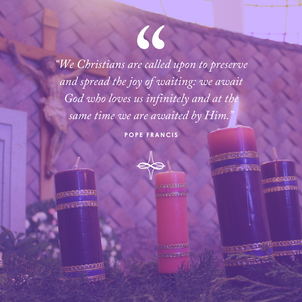
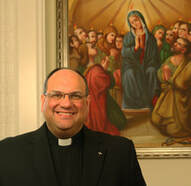
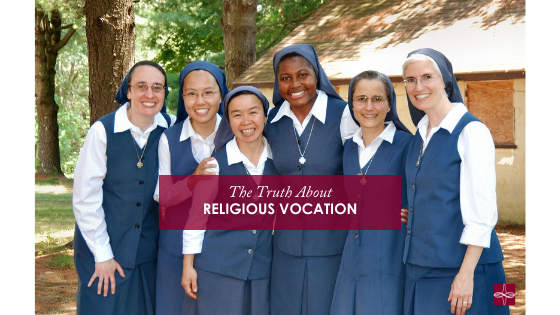
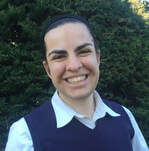
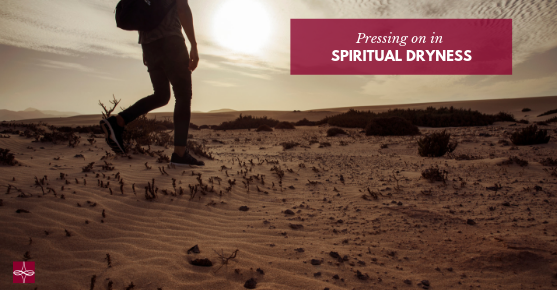

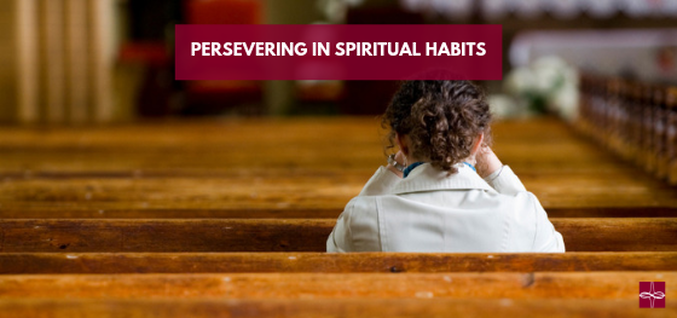

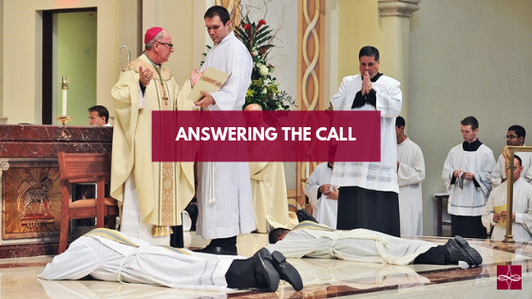

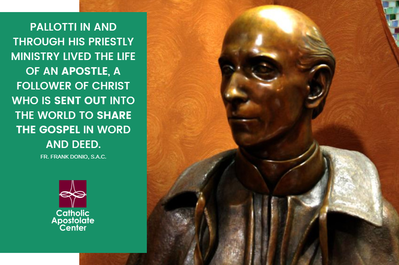
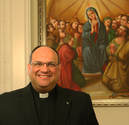
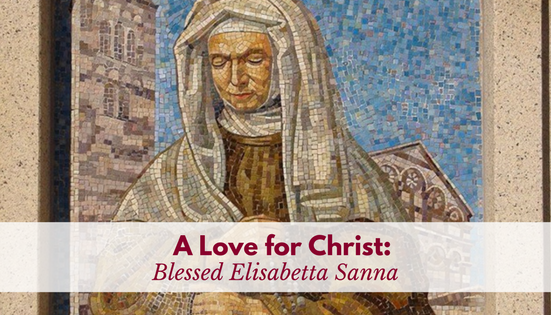

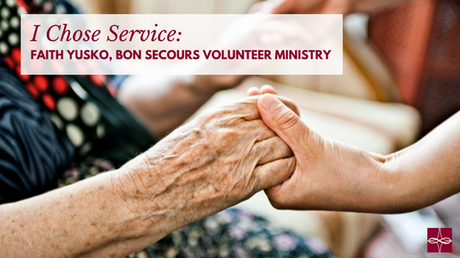
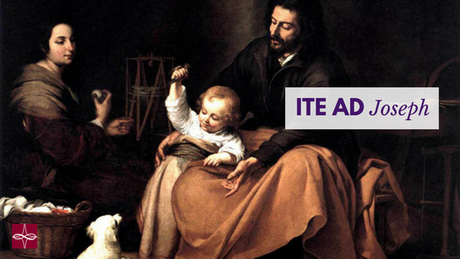


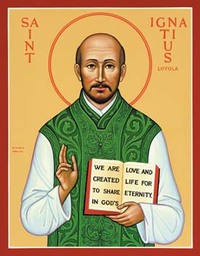



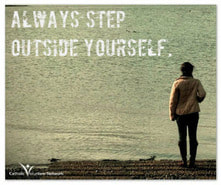
 RSS Feed
RSS Feed